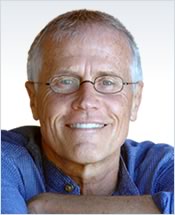Paul Hawken
-
Material Issues
- Materiality Analysis
- Climate Change
- Mobility
- Human Rights
- Vehicle Safety
- Sustaining Ford
-
Perspectives on Sustainability
- Lewis Booth, Ford Motor Company
- Bert Bras and Tina Guldberg, Georgia Institute of Technology
- Melissa Forbes, University of Michigan
- Paul Hawken
- Dr. Adrian K. Lund, Insurance Institute for Highway Safety and the Highway Loss Data Institute
- Mark Mittelhauser, U.S. Department of State
- John Viera, Ford Motor Company
Environmentalist, entrepreneur, journalist, author
We could debate how quickly or slowly climate change is occurring, but since no one knows for sure, it's a useless exercise. We will know the rate of change in hindsight, but that should not prevent us from taking action now.
It's the uncertainty over the rate of change that creates a rationale for inaction among some. I interpret it the other way around. Uncertainty calls for action precisely because of what we don't know. Some scientists tell us that a permissible limit for CO2 is 450 parts per million (ppm); others say it is 350ppm. Since we're already at 387, the mandate is clear. This is a physics and engineering problem that is solvable – but not if we dither.
The pluses for addressing climate change are huge, and the minuses are almost negligible. Tackling climate change addresses energy security, creates jobs and cultivates rapid innovation in technology.
The biggest obstacle to addressing climate change is ignorance. Many people simply don't understand the data, the science and the related implications. Climate change has been gamed by the media in such a way as to introduce doubt where there is none. This is not an environmental issue. It is a civilizational issue, and the first truly global one in the history of humankind.
This general lack of understanding creates problems for companies that are working to adapt their products and confront the issue. To whom will they sell? To the 80 percent that don't understand the problem or to the 20 percent that are concerned and want to do something about it? Companies need 100 percent of sales, not 20 percent, so the dilemma is obvious.
The question for a large company like Ford is, how quickly can it adapt to changing environmental and market conditions so it can outmaneuver competitors, but without penalizing its capital costs? This is a period in which business destinies will be made or broken. Historically, companies have resisted change in favor of the status quo. I think you can say, with all due respect, that Detroit had been stuck in the past for quite a while. So what is the auto industry going to do going forward now that the status quo has been pulled out from underneath them?
It takes years for a new automobile design to reach consumers. Ford has been reducing the cycle time to become more adaptive and using global platforms to create a more resilient, flexible system. Those who foment and demand efficiency changes in the American automobile fleet want it yesterday, which is understandable. But we're still talking about iron here – and that has its own rate of transformation.
You can't sell cars that people won't buy, even if they're better for the environment. There remains a significant gap between the harmonization of what's good for us, and what a consumer can or will actually purchase. Ford has to manage its product timeline so they're not reacting after the fact to shifts in customer demand. Conversely, we all know that if you get too far ahead of the curve, you fall off. How do you engineer the car for the future if the future is changing faster than ever? This is not an easy task.
Ford, which has really exciting products in the pipeline, has a challenge and an opportunity in the way it communicates with the public. For example, I don't think it's well understood that Ford's new Fusion hybrid is the best midsize hybrid in the market. That's a big deal.
Ford Motor Co. started with a communitarian sense when it began in 1903. I believe Ford needs to communicate the idea that they are making changes to their automobiles so that society and humanity can continue to evolve and grow. That may be an aspirational vision, but it's a pressing need in the face of climate change.
I have said in the past that if you look at climate change data, and you're optimistic, then you're not understanding the data. However, if you look at people who are working to address the future and you're not optimistic, then you don't have a pulse. It's Dickensian in that way – being the best and worst of times. The best is what many people are doing now and the worst is the legacy of what we've done to our planet out of ignorance.

Paul Hawken
Environmentalist, entrepreneur, journalist, author
Related Links
- In This Report: